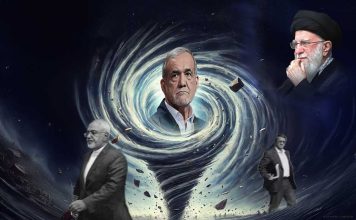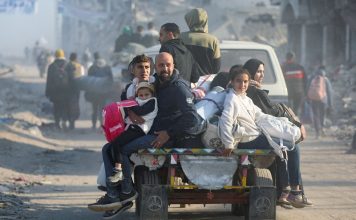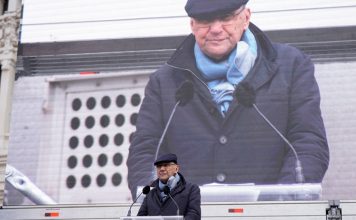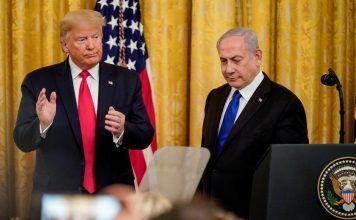Footage posted on social media shows that composing slogans has become a growing trend in the recent nationwide protests sparked by the death of Mahsa (Zhina) Amini, a 22-year-old who died while in the custody of the morality police in Tehran on Sept. 16.
Some demonstrators have been shouting rhyming chants in the streets, from the rooftops and out of their windows. Others have been spraying defiant messages on the walls of towns and cities, using stencils, or crossing out images of Islamic Republic officials.
A banner in Qom on a bridge with a photo of Nika Shakarami, 17 y.o, killed in the protests. Written on it: "Nika, we'll continue your path," "Women, Life, Freedom" and to the authorities: "We're all Nika. Attack us and we will fight back."#MahsaAmini #IranRevolution#مهسا_امینی pic.twitter.com/Ixg20RLspG
— 1500tasvir_en (@1500tasvir_en) October 16, 2022
Some of the more memorable slogans chanted by crowds in the recent protests include “Women, life, freedom,” “Reza Shah, bless your soul,” “This is the year of blood, Seyyed Ali will go,” “Death to Khamenei,” “Cannons, tanks, and bullets, clerics get lost,” and “Death to the dictator.” (Seyyed Ali’ and ‘Khamenei’ are references to Iran’s Supreme Leader, Ayatollah Ali Khamenei.)
[aesop_image img=”https://kayhanlife.com/wp-content/uploads/2022/10/2022-10-27T065456Z_191573779_OWSPLP4UOSZ8MZFDUWF2G5317KINWUY_RTRMADP_BASEIMAGE-960X540_IRAN-TEHRAN-PROTEST.jpg” panorama=”off” credit=”A woman in Iran boldly defies mandatory veiling laws by removing her hijab and brushing her hair in the middle of a street in Tehran. REUTERS./” align=”center” lightbox=”on” captionsrc=”custom” captionposition=”left” revealfx=”off” overlay_revealfx=”off”]
Kayhan Life interviewed a young girl who spoke on condition of anonymity who was arrested while writing a slogan in a Tehran neighborhood during a recent protest. She did not share details of how she escaped.
How did you get arrested, and how were you treated afterward?
I parked my car in a different spot, and walked a long distance, carrying a can of spray paint. I had been protesting in the street on previous nights and did not think I would be arrested for writing a slogan in an empty alley.
I had finished spraying the letter ‘r’ in the slogan ‘Death to the dictator’ when a hand grabbed my neck from behind.
I did not understand how a person’s hand could hold my entire head. I was suffocating as his fingers tightened. He then grabbed my neck with the same hand and knocked me to the ground. My head hurt badly and was wet, so it felt like I was bleeding.
It had gotten dark by then. The agent then put his foot between my breasts, pressing down and turning. My vision was blurred.
I tried to look at him. I remember his face. He was in plain clothes and was holding a walkie-talkie. He called someone named ‘Mohammad’ while shouting profanities at me.
I was scared, and my heart was beating fast under his foot. My heartbeat was ringing in my ears.
He told Mohammad, who answered his call, to take ‘this slut’ to the car. He dragged me on the pavement and threw me at [Mohammad’s] feet.
Wearing a military uniform, Mohammad grabbed my arm and pushed me forward. I begged him to let me go. He kept telling me to shut up, but I was not mistreated.
He handed me over to another person once we got to a white van.
Mohammad did not get in the van. The van started moving. Later, I realized that they patrol the streets on foot, using walkie-talkies to communicate. They then hand people over to any of their vehicles arriving at the scene.
Inside, the van differed from the normal ones. There were seats on both sides. Some people were sitting on the seats, and others were on the floor.
The first thing they did was confiscate the mobile phones of anyone they pushed into the van. It was humiliating, and I get upset when I recall that experience.
They started hitting me when I said I didn’t have a phone. They searched my body, even running their hands through my underwear, and threw me on the van’s floor when they realized that I had no mobile phone.
They accused me of being a leader who had received training because I had no mobile phone, and used it as an excuse to further mistreat me.
When they threw me on the floor, I fell on a boy who could not be older than 12. I was crying, and he was wiping tears off my face. One of the plainclothes agents hit the boy’s hand with a gun. I thought the blow surely broke my jaw and the boy’s hand.
Why did you not carry a mobile phone?
My mother has been fighting the Islamic Republic in various ways for years. Since I was a child, I have seen the various measures she has taken to protect herself. I knew she never carried her bank cards in protests. So I left all my belongings, including my bag, in the car.
I was thinking about my mother during that experience and wondering what she would do if something happened to me.
Where did they take you? Was it a detention center?
When we got close to the place, the location of which I cannot disclose, two people kept shouting at us, saying ‘Eyes closed, heads down.’ They kept repeating that to distract our attention and prevent us from knowing where we were. Anyone who moved was kicked in the head.
I learned to determine locations and directions.
The van was moving at a speed of 40 to 50 kilometers an hour. I thought they would change direction to confuse us. As soon as I lowered my head, I started counting, and kept track of the number of left and right turns and the direction that the van took.
When my mother discovered the location sometime later, she realized that they had not deviated from the normal path. They probably thought that, as children, we had no sense of direction.
Do you mean you know where the place is?
Yes. From the outside, it looks like a regular apartment building. There are curtains on windows, and lights come on at night.
When I saw the picture of the house, I thought it was not where they had taken us, given that all of the windows of the apartment we were in were covered with bricks and cement blocks.
But my mother said the light coming from the windows at night was not normal. It seemed that the place was lit from below and above.
The light was not coming from the center of the room, and the curtains were different, to make the place look ordinary. The neighbors looked strange, and the entire apartment looked unusual.
They had covered the windows in all of the rooms of the house where I was kept. Other rooms had no windows, and the walls were soundproof.
What happened to you and others in that house? How were you interrogated?
Before taking us out of the van, they instructed us to keep our heads down and put on blindfolds.
They allowed us to remove our blindfolds once we were in the hallway. Some people were already there and had been transferred from a police station. They had been arrested by the regular police, who handed them over to the security police.
Several of us formed a group and promised each other that whoever escaped would exact revenge for the others. That gave us much strength. It gave me a purpose to live, and survive every moment that I was tortured.
I denied having a spray can, which was their evidence against me. Remaining steadfast and refusing to confess was crucial to my rescue, despite the pain and hardship of it.
What kind of torture did you endure?
Every second in that place was psychological torture. The call to prayer broadcast on loudspeakers, the cries of people being tortured in the next room, and the foul air we breathed were all part of the torture.
Only a few people among us that night were in their early thirties. The rest were all aged between 12 and 20. We had seen each other in the hallway.
They threw us into trash bags as if we were potatoes in a burlap sack. We discovered that they transported people by stuffing them in bags, piling them on top of each other in elevators, and moving them to other floors.
The elevator went up and down, but ultimately, they took us to the basement.
That night, around 1 or 2 am, they seemed to throw the sacks in a pool of ice water. I don’t remember how long we were in the water, but our bodies became numb.
They pulled us out of the water and hit us with sticks. They kept repeating the same thing. One person in our group who had a heart condition died that night. We discovered it after hearing one of our abductors telling the others that the person ‘is dead and must be transferred.’
I don’t know if the cold made me imagine things, but I could feel ice cubes rubbing against my feet when I was in the pool. We remained in a fetal position in the sacks for 24 hours. They left us, half-conscious, in the bags on the ground for a few hours.
They eventually threw us into separate rooms. When they finally opened the bag and let me out, I could see nothing, and the light hurt my eyes.
Two people interrogated me in that room, where stacks of bricks covered the windows. One asked me a question, while the other one hit me. If the interrogator knocked me to the floor, the other person would pick me up and put me back in the chair.
They told me different things. They wanted me to confess that I was active in a political group. They wanted me to admit that I had received money to write slogans using paint spray.
Being in the bag throughout the previous night had hurt my back, so I could not sit up straight. They kept hitting me to sit up straight, and if I bent over, the man standing behind me hit my back with his knee.
After a few hours, a person who seemed to be a doctor and two other people arrived. After examining me, they said that I needed to be taken to the hospital. They put me in a room alone after I threw up blood and fainted.
But they did not even give me a painkiller. They never gave me any food, only water a few times. After the doctor left, they gave me something that had a bitter taste. I said I had no appetite, but they forced me to eat it.
When was the first time you opposed the Islamic Republic? Were you prepared to be arrested and endure the torture you suffered?
I don’t remember the exact date, but I removed my headscarf one day and stood among a large group of students wearing burqas. There is a photograph of that day.
The Islamic Republic’s vision of society differs vastly from our upbringing. I don’t want to change myself, but I will change this society. I have that power as a member of the generation born in the 2000s.
I was nine years old when I sold my old roller skates. I planned to buy a new pair that summer with the money I had saved. Instead, I gave the money to my mother to buy a color photocopier and print Crown Prince [Reza Pahlavi’s] statements and her night letters.











